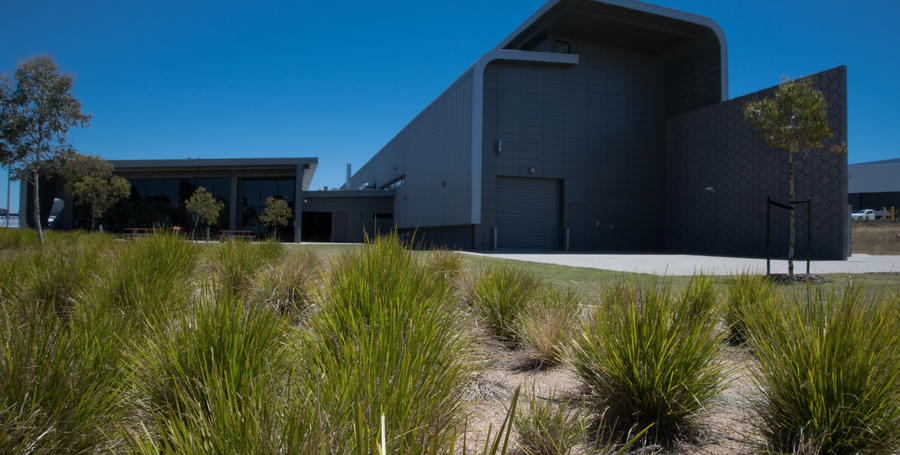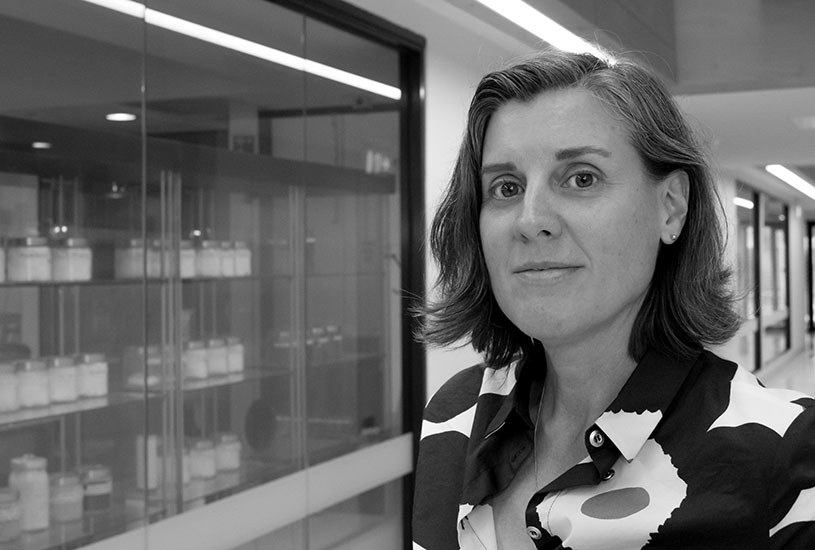In the field of computational bionanotechnology, where the interface between biological matter and nanomaterials is investigated at the atomic scale using supercomputers, Professor Tiffany Walsh is an internationally-renowned figure.
Professor Walsh and her team at Deakin University’s Institute of Frontier Materials (IFM) use computer modelling to predict the structure and properties of matter at the molecular scale, with the aim of discovering and understanding new materials with exceptional functionality.
“When I arrived at Deakin in 2012 I already had experience in researching the bio/nano interface of nacre, or mother-of-pearl, found in abalone shell,” Professor Walsh says. Nacre contains special biomolecules that form a ‘soft handshake’ between the brittle nano-sized mineral platelets and the soft biopolymer matrix that comprise this naturally-occurring composite material.
“When I started collaborating with Deakin’s Carbon Nexus team, we translated this concept of the ‘soft handshake’ into the realm of carbon fibre reinforced composites. In this case, the carbon fibre is the hard material that is embedded in a relatively softer synthetic polymer matrix.”
The experimental team at Carbon Nexus was able to attach designer molecules to the carbon fibre surface and embed them into the synthetic polymer, which resulted in better mechanical performance. This is one example of the many ongoing, fruitful and productive collaborations between IFM and Carbon Nexus.

When she isn’t giving materials super powers, Professor Walsh serves as a board director for veski, an organisation that connects, supports and inspires organisations across Victoria that contribute to the State’s innovation culture.
“My involvement as a board director at veski has been, and continues to be, an enriching journey,” she says. “I’m continuously learning from our CEO, Julia Page, and our Chair, Professor Ian Smith, who are both an inspiration for me in terms of leadership with integrity.”
As a board director, Professor Walsh has the task of serving on the selection committee for the veski Innovation Fellowship, an academic honour that she received herself in 2012 and held while at IFM.
Her Fellowship was the catalyst for her relocation back to Australia from the UK, having earned her PhD in theoretical chemistry from the University of Cambridge. Despite enjoying a rich career in the UK, Professor Walsh was required to rebuild her entire research portfolio from scratch upon moving back to Australia, because most of her research networks were developed overseas.
This only serves to make her achievements all the more impressive. Professor Walsh now has six grant-funded projects underway, where she is Lead Chief Investigator for three of them. Some of these projects involve collaborations with partners in the US, the UK, and Denmark.
And she still has the time to squeeze in involvement with industrial projects as part of her portfolio, as well as collaborations with the Australian Research Council Centre of Excellence in Nanoscale Biophotonics.
“Needless to say, I’m kept busy,” she says.
Professor Walsh was recently recognised for her outstanding work in her field via publication in a special focus issue of AVS Journal’s ‘Biointerphases’. Lead by an all-female editorial team, the issue sought to highlight the work of world-leading female biointerface scientists.
“It’s always nice, and unexpected, to be recognised,” Professor Walsh says. “Their idea is a pioneering one. A special issue that recognised female contributions in the specific area of biointerfaces was a first for me, so when the editorial team approached me for this project I was honoured and delighted to be involved.”
Professor Walsh was particularly impressed by the team’s high degree of impartiality and integrity in choosing which contributions to publish.
“Every researcher featured in this issue rightly deserves to be there on merit, not on connections,” she says.
‘Biointerphases’ asked contributors to offer advice to emerging female scientists in their field of work. Professor Walsh says that integrity and altruism are valuable traits to hold, especially in positions of leadership.
“A high EQ is just as important as a high IQ,” she says. “Science would be a better place if more scientists at the top of their field could break with the egocentric ‘all about me’ culture that is sometimes associated with highly successful researchers. This would provide ideal role models for the generations who follow us, and will help to build a culture where aptitude, drive, independence, and teamwork, can thrive in our early career researchers.
“Leadership is not about what is says in your job title; no matter what your career stage, or where you are placed in the organisational chart, it is always possible to lead, and be a great example for others.”
Melina Bunting
Staff writer



